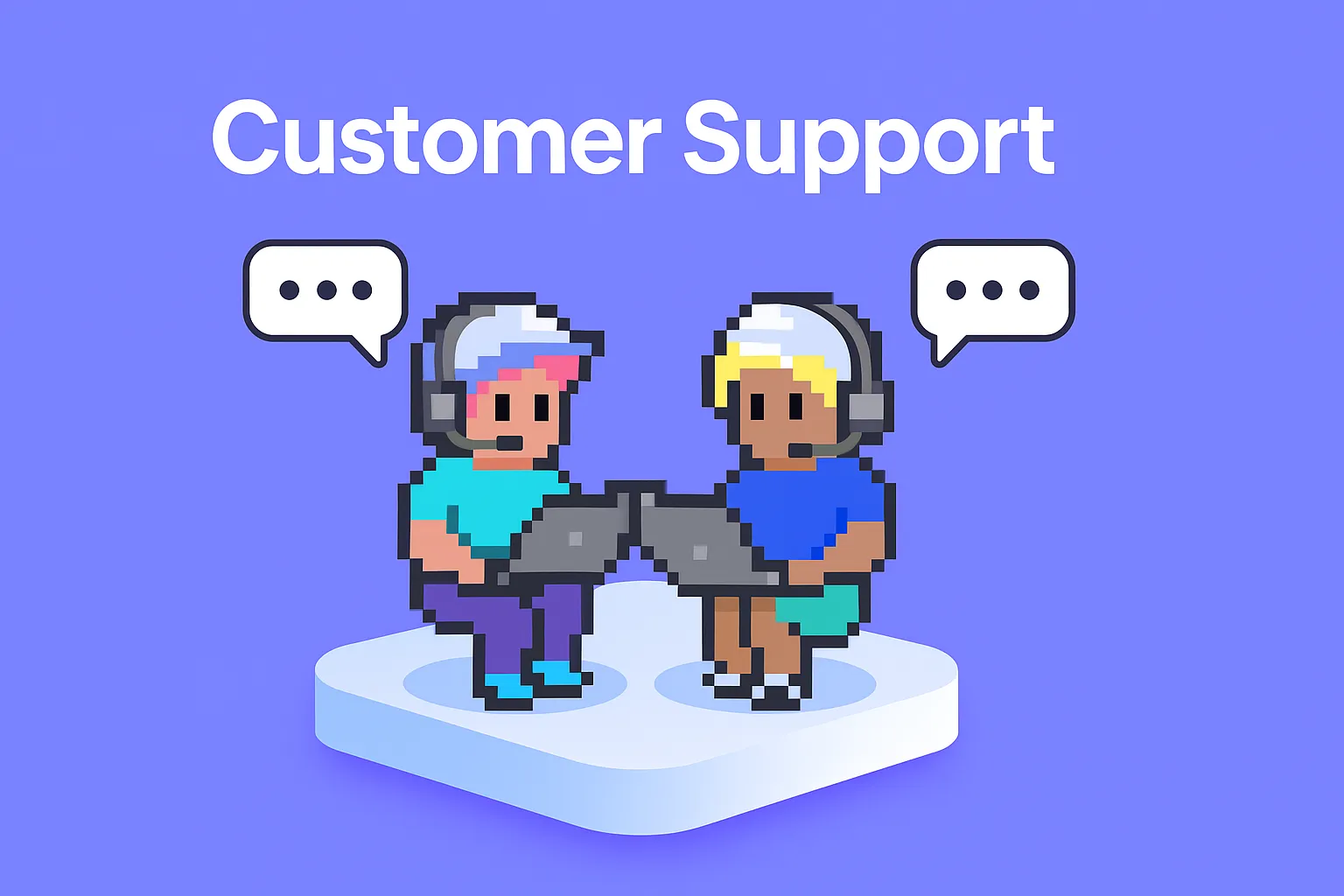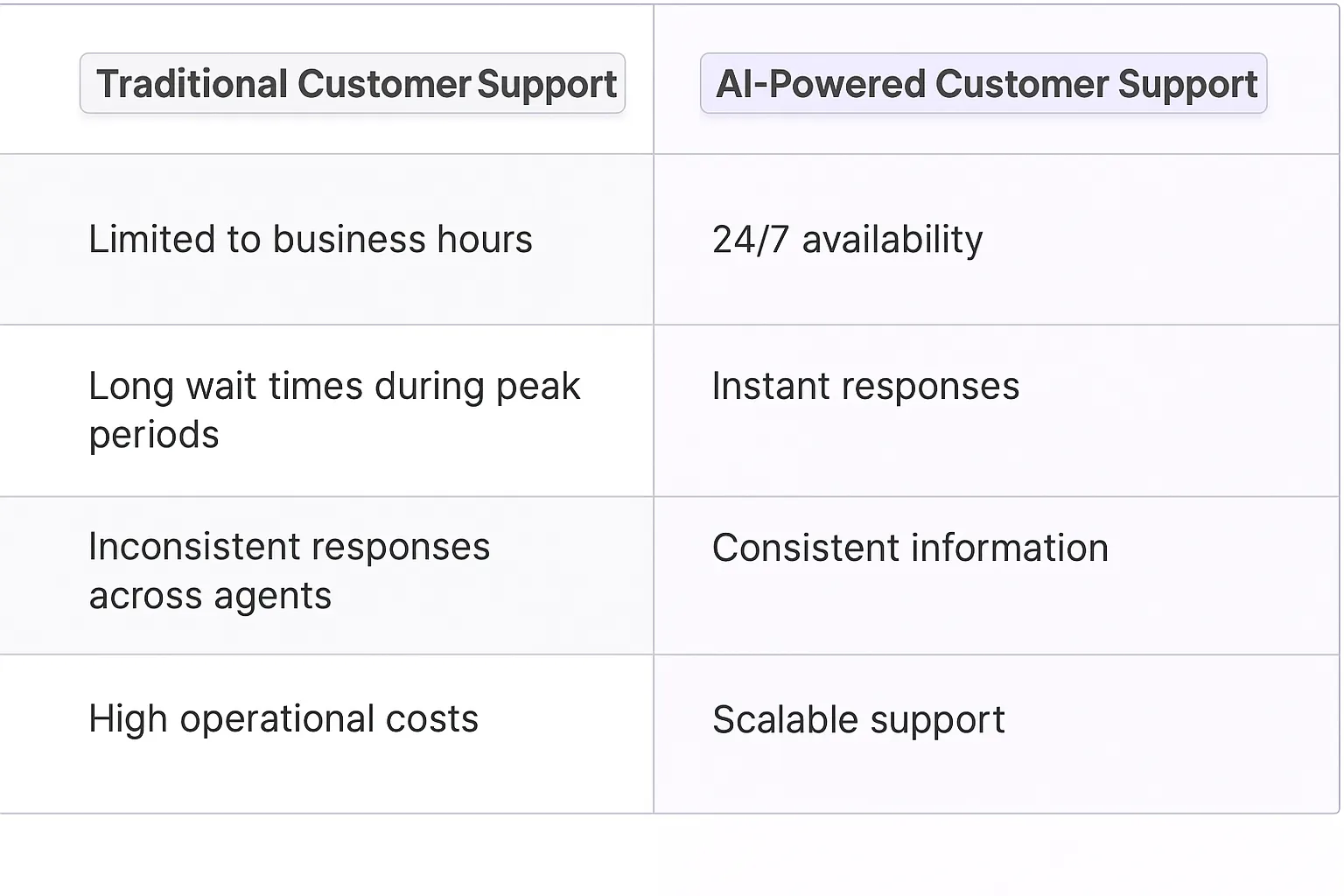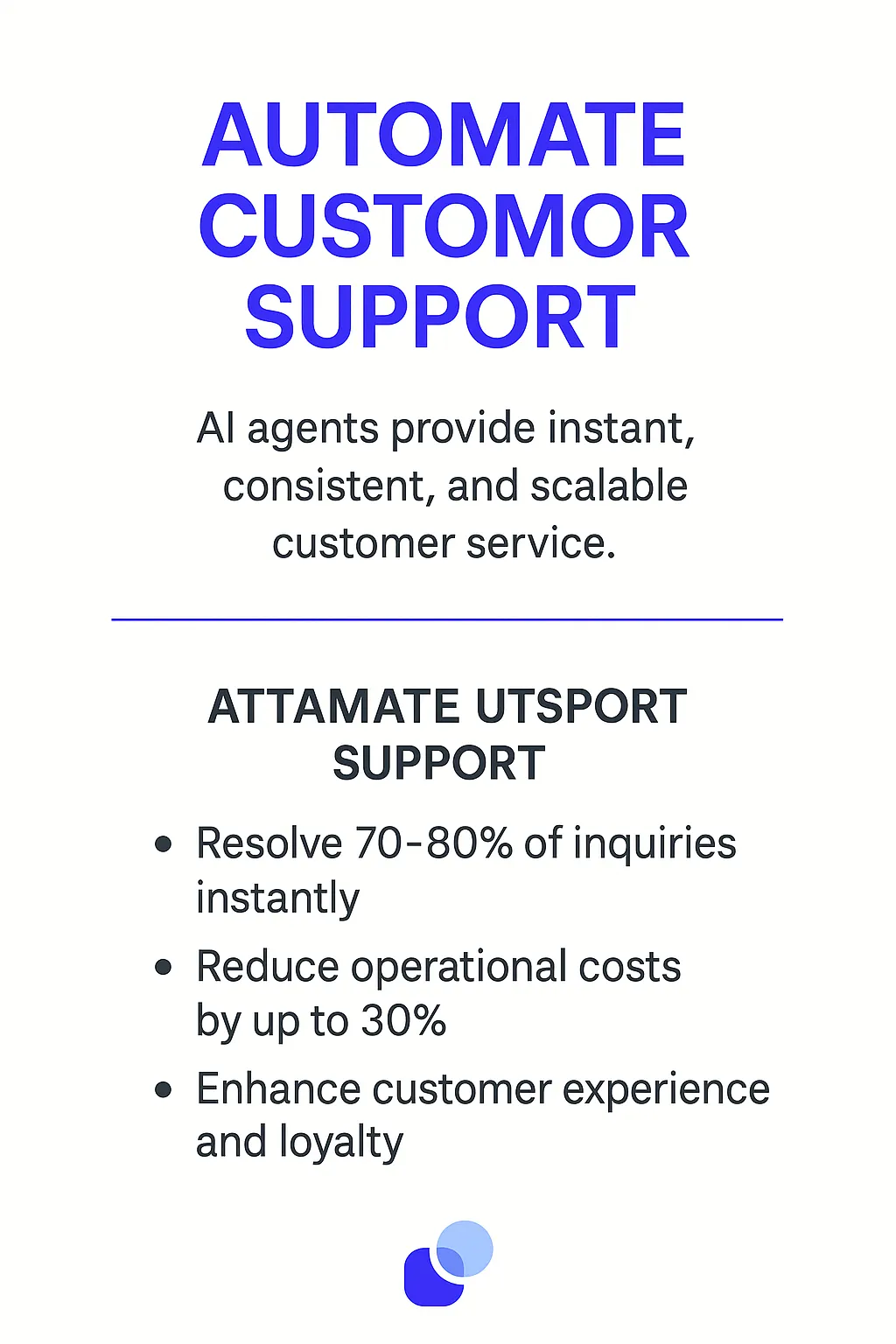Customer Support AI Agents
The Evolution of Customer Support in the AI Era
Customer support is the backbone of any successful business, serving as the primary interface between a company and its customers. It's not just about answering questions or resolving issues; it's about building relationships, fostering loyalty, and driving business growth. In the digital age, customer support has evolved from simple phone lines to omnichannel experiences, encompassing everything from email and chat to social media interactions.
Effective customer support is characterized by several key features:1. Responsiveness: Quick and efficient handling of customer queries and concerns.2. Empathy: Understanding and addressing the emotional needs of customers.3. Knowledge: Deep understanding of products, services, and company policies.4. Problem-solving: Ability to resolve complex issues creatively and effectively.5. Consistency: Delivering uniform quality of service across all touchpoints.6. Scalability: Adapting to fluctuating demand without compromising quality.7. Personalization: Tailoring support to individual customer needs and preferences.AI agents are now augmenting these features, bringing a new level of efficiency and intelligence to customer support operations. They're not replacing human agents but rather enhancing their capabilities, creating a symbiotic relationship that's redefining the customer experience landscape. A Customer Success Manager can leverage these AI capabilities to deliver even more personalized and effective support.

Benefits of AI Agents for Customer Support
What would have been used before AI Agents?
Before AI agents entered the customer support arena, companies relied on a mix of human-powered solutions and basic automation. You'd typically see tiered support systems with frontline agents handling simple queries, escalation paths for complex issues, and knowledge bases for self-service. Some businesses implemented rudimentary chatbots, but these were often frustrating for users due to their limited understanding and rigid response patterns.
The traditional setup had its merits, but it also came with significant drawbacks. Scalability was a constant challenge, especially during peak times or unexpected surges in support requests. Response times could be slow, and consistency across interactions varied widely depending on the agent handling the case. Moreover, the cost of maintaining a large support team, especially for 24/7 coverage, was a substantial burden for many companies. A Customer Service Manager would often struggle with these operational challenges.
What are the benefits of AI Agents?
AI agents are fundamentally changing the customer support landscape. They're not just incremental improvements; they're a paradigm shift in how we think about service delivery. Here's why they're game-changers:
1. Scalability on demand: AI agents can handle thousands of interactions simultaneously without breaking a sweat. This elasticity is crucial for businesses with fluctuating support needs or those experiencing rapid growth.
2. 24/7 availability: Unlike human agents who need sleep and days off, AI agents are always on. This round-the-clock availability can significantly improve customer satisfaction, especially for global businesses serving multiple time zones.
3. Consistency and accuracy: AI agents deliver uniform responses based on the most up-to-date information. They don't have bad days or forget crucial details, ensuring a consistent experience for every customer.
4. Speed and efficiency: AI agents can process and respond to queries in milliseconds, dramatically reducing wait times. They can also handle multiple queries concurrently, increasing overall efficiency.
5. Continuous learning and improvement: Modern AI agents use machine learning to improve over time. They learn from each interaction, becoming more adept at handling complex queries and understanding nuanced customer needs.
6. Cost-effectiveness: While there's an initial investment, AI agents can significantly reduce operational costs in the long run. They can handle a large volume of queries that would otherwise require a substantial human workforce.
7. Data-driven insights: AI agents can analyze patterns in customer queries, providing valuable insights that can inform product development, marketing strategies, and overall business decisions.
8. Seamless escalation: When issues surpass their capabilities, AI agents can smoothly transfer conversations to human agents, providing context and history for a seamless transition.
9. Personalization at scale: By leveraging customer data and interaction history, AI agents can provide personalized support that feels tailored to each individual, even when handling thousands of customers.
10. Proactive support: Advanced AI agents can anticipate customer needs based on behavior patterns and proactively offer assistance, potentially resolving issues before they even arise.
The integration of AI agents in customer support isn't just about automation; it's about augmenting and enhancing human capabilities. As these digital teammates become more sophisticated, we're moving towards a future where the line between AI and human support blurs, creating a synergy that elevates the entire customer experience.

Potential Use Cases of AI Agents in Customer Support
Processes
Customer support is ripe for AI-driven transformation. Digital teammates can handle a significant portion of support processes, freeing up human agents to focus on complex issues and high-touch interactions. Here's how AI agents can revolutionize customer support processes:
- Ticket Triage: AI agents can analyze incoming support tickets, categorize them based on urgency and complexity, and route them to the appropriate human agent or department.
- Knowledge Base Management: These digital teammates can continuously update and optimize the knowledge base, ensuring that information remains current and easily accessible.
- Customer Sentiment Analysis: By analyzing customer interactions across various channels, AI agents can provide real-time insights into customer sentiment, helping companies proactively address issues before they escalate.
- Multilingual Support: AI agents can provide seamless support in multiple languages, breaking down language barriers and expanding global reach without the need for a large multilingual support team.
Tasks
When it comes to specific tasks, AI agents in customer support can be game-changers. They're not just about automating responses; they're about enhancing the entire support experience. Here are some key tasks where AI agents excel:
- Instant Query Resolution: AI agents can provide immediate responses to common questions, reducing wait times and improving customer satisfaction.
- Guided Troubleshooting: For technical issues, AI agents can walk customers through step-by-step troubleshooting processes, adapting based on customer feedback.
- Order Status Updates: AI agents can quickly retrieve and communicate order statuses, tracking information, and estimated delivery times.
- Appointment Scheduling: These digital teammates can manage appointment bookings, reschedules, and cancellations, syncing with calendar systems in real-time.
- Feedback Collection: AI agents can conduct post-interaction surveys, collecting valuable customer feedback to improve service quality.
The integration of AI agents in customer support isn't about replacing human agents; it's about augmenting their capabilities. By handling routine queries and processes, AI agents free up human agents to tackle complex issues that require empathy, creativity, and deep problem-solving skills. This symbiosis between AI and human agents creates a support ecosystem that's more efficient, scalable, and ultimately, more satisfying for customers.
As we move forward, the companies that will win in the customer support space will be those that effectively blend AI capabilities with human touch. They'll use AI not just as a cost-cutting measure, but as a tool to elevate the overall customer experience. The future of customer support isn't human OR AI - it's human AND AI, working in concert to deliver exceptional service.

Industry Use Cases for Customer Support AI Agents
AI agents are reshaping customer support across industries, and their impact is far more nuanced than simple automation. These digital teammates are becoming integral to support teams, handling complex queries and enhancing human capabilities in ways we're only beginning to grasp.
The real power of AI in customer support lies in its ability to learn and adapt. Unlike static FAQ systems or rigid chatbots, these agents evolve with each interaction, becoming more adept at understanding context, tone, and even cultural nuances. This adaptability makes them invaluable across diverse sectors, each with its unique support challenges.
Let's dive into some industry-specific scenarios where AI agents are not just assisting, but transforming customer support operations. These examples illustrate how AI is tailoring its capabilities to meet the distinct needs of different business environments, from e-commerce to healthcare. A Support Operations Manager can orchestrate these AI implementations across different departments, while a Customer Experience Specialist can ensure that the AI integration enhances rather than detracts from the overall customer journey.
E-commerce: Elevating Customer Support with AI Agents
The e-commerce industry is ripe for a customer support revolution, and AI agents are leading the charge. Let's dive into how these digital teammates are transforming the way online retailers handle customer inquiries and boost satisfaction rates.
Consider a high-volume e-commerce platform dealing with thousands of customer queries daily. Traditional support methods often buckle under this pressure, leading to long wait times and frustrated shoppers. Enter AI agents designed specifically for customer support.
These AI-powered helpers can simultaneously engage with hundreds of customers, providing instant responses to common questions about order status, return policies, and product information. But they're not just glorified FAQ bots. The real magic happens when they start to learn and adapt.
By analyzing patterns in customer interactions, these AI agents can identify trending issues before they become full-blown crises. For instance, if there's a sudden spike in queries about delayed shipments from a particular region, the AI can flag this to the operations team, potentially averting a customer service meltdown.
Moreover, these digital teammates can personalize interactions based on a customer's purchase history and browsing behavior. Imagine a loyal customer inquiring about a product. The AI agent doesn't just provide generic information; it offers tailored recommendations based on the customer's style preferences and past purchases, effectively turning a support interaction into a sales opportunity.
But here's where it gets really interesting: these AI agents can learn to detect emotional cues in text-based conversations. They can identify when a customer is frustrated and seamlessly escalate the issue to a human agent, complete with context and suggested solutions. This hybrid approach ensures that human empathy is applied where it's needed most, while routine queries are handled efficiently by AI. A Customer Support Representative can focus on these complex cases, while an Escalation Predictor can help identify which cases need immediate human attention.
The result? Dramatically reduced response times, increased first-contact resolution rates, and a level of scalability that traditional customer support models can only dream of. E-commerce businesses leveraging these AI agents are seeing measurable improvements in customer satisfaction scores and, crucially, in repeat purchase rates.
As these systems continue to evolve, we're moving towards a future where AI agents in e-commerce customer support don't just react to problems – they proactively enhance the entire shopping experience, blurring the lines between support, sales, and customer engagement.
Financial Services: AI Agents Redefining Customer Support in Banking
The banking sector is undergoing a seismic shift in customer support, and AI agents are at the epicenter. These digital teammates are not just answering queries; they're reshaping the entire customer experience in financial services.
Take a large retail bank with millions of customers. Traditional support models struggle with the sheer volume and complexity of inquiries, from basic account balance checks to intricate loan applications. AI agents are stepping in to transform this landscape.
These AI-powered systems can handle an array of tasks simultaneously, from providing real-time account information to guiding customers through complex financial products. But their true value lies in their ability to learn and adapt on the fly.
By analyzing vast amounts of transaction data and customer interactions, these AI agents can spot unusual patterns that might indicate fraud before it becomes a major issue. If there's a sudden uptick in suspicious transactions from a particular merchant, the AI can alert the security team, potentially saving millions in fraudulent charges.
What's more, these digital teammates can offer personalized financial advice based on a customer's spending habits, savings goals, and risk tolerance. A customer inquiring about investment options doesn't just get a generic brochure; they receive tailored recommendations that align with their financial profile and life stage.
The real game-changer is how these AI agents handle emotional intelligence in text and voice interactions. They can detect stress or frustration in a customer's tone or language, especially when discussing sensitive topics like loan rejections or overdraft fees. In these cases, they can smoothly transition the conversation to a human financial advisor, providing a full context of the interaction and suggested solutions.
This hybrid model ensures that human expertise is applied where it's most impactful, while routine queries and transactions are handled efficiently by AI. The results are striking: drastically reduced wait times, higher resolution rates on first contact, and a scalability that traditional banking support can't match.
Banks leveraging these AI agents are seeing tangible improvements in customer satisfaction scores and, crucially, in customer retention rates. They're also opening up new revenue streams by intelligently cross-selling products based on individual customer needs and behaviors. A Customer Retention Specialist can work alongside these AI systems to identify at-risk customers and implement targeted retention strategies.
As these systems evolve, we're moving towards a future where AI agents in banking don't just provide support – they become proactive financial advisors, blending the lines between customer service, financial planning, and personalized banking experiences. This isn't just about answering questions; it's about fundamentally changing how people interact with their finances.
Considerations
Technical Challenges
Implementing a customer support AI agent isn't just about slapping a chatbot on your website and calling it a day. It's a complex dance of algorithms, data, and user experience that requires careful choreography.
First up, we've got the natural language processing (NLP) hurdle. Your AI needs to understand the nuances of human communication - sarcasm, context, and those pesky regional dialects. It's like teaching a robot to appreciate stand-up comedy; it's not impossible, but it's definitely not easy.
Then there's the integration nightmare. Your AI agent needs to play nice with your existing CRM, ticketing system, and knowledge base. It's like trying to get a group of cats to perform a synchronized swimming routine. Possible? Yes. Challenging? Absolutely.
Let's not forget about scalability. Your AI needs to handle peak times without breaking a sweat. It's like building a bridge that can suddenly expand to accommodate rush hour traffic. You need robust infrastructure and clever load balancing to pull this off.
Operational Challenges
On the operational side, we're dealing with a whole different beast. First off, there's the data privacy tightrope walk. Your AI is handling sensitive customer information, so you need Fort Knox-level security measures. One data breach and you're looking at a PR nightmare that makes the Titanic look like a minor boating incident.
Then there's the human-AI collaboration conundrum. How do you seamlessly hand off complex issues from AI to human agents? It's like a high-stakes relay race where dropping the baton means losing a customer.
Training and maintenance is another can of worms. Your AI needs constant feeding with fresh data to stay relevant. It's like having a pet that needs to be fed a diet of pure knowledge. Miss a few meals, and suddenly your AI is giving outdated or incorrect information.
Lastly, there's the challenge of managing customer expectations. Some folks will expect your AI to be omniscient, while others will resist talking to a "robot" at all. Striking the right balance is like walking a tightrope while juggling flaming torches. Exciting? Yes. Easy? Not by a long shot.
Implementing a customer support AI agent is a journey filled with technical and operational hurdles. But for those who can navigate these challenges, the potential rewards in terms of efficiency, scalability, and customer satisfaction are enormous. It's not for the faint of heart, but then again, what worthwhile endeavor is? A Technical Support Manager can help navigate the technical complexities, while a Support Quality Assurance Analyst can ensure that the AI implementation maintains high standards of service quality.
The Future of Customer Support: A Synergy of AI and Human Touch
The integration of AI agents in customer support isn't just a trend; it's a fundamental shift in how businesses interact with their customers. These digital teammates are breaking down barriers of scalability, consistency, and personalization that have long plagued traditional support models.But let's be clear: this isn't about replacing humans with robots. It's about creating a synergy between AI and human agents that elevates the entire customer experience. The most successful implementations will be those that strike the right balance, leveraging AI for efficiency and scale while preserving the human touch for complex, emotionally nuanced interactions.As we look to the future, the companies that will win in the customer support arena will be those that view AI not just as a cost-cutting measure, but as a strategic asset for building stronger, more meaningful customer relationships. They'll use AI to free up their human agents to do what they do best: empathize, problem-solve, and create genuine connections.The road ahead is filled with challenges, from technical hurdles to operational complexities. But for those who can navigate these waters, the potential rewards are enormous. We're not just talking about improved metrics or reduced costs; we're talking about fundamentally transforming the way businesses interact with their customers. A Customer Journey Manager can help orchestrate this transformation, while a Support Analytics Manager can provide the data-driven insights needed to optimize the AI-human collaboration.In this new paradigm, customer support isn't just a necessary evil or a cost center. It's a powerful driver of customer loyalty, brand differentiation, and ultimately, business growth. The future of customer support is here, and it's powered by the incredible potential of AI agents working in harmony with their human counterparts.













